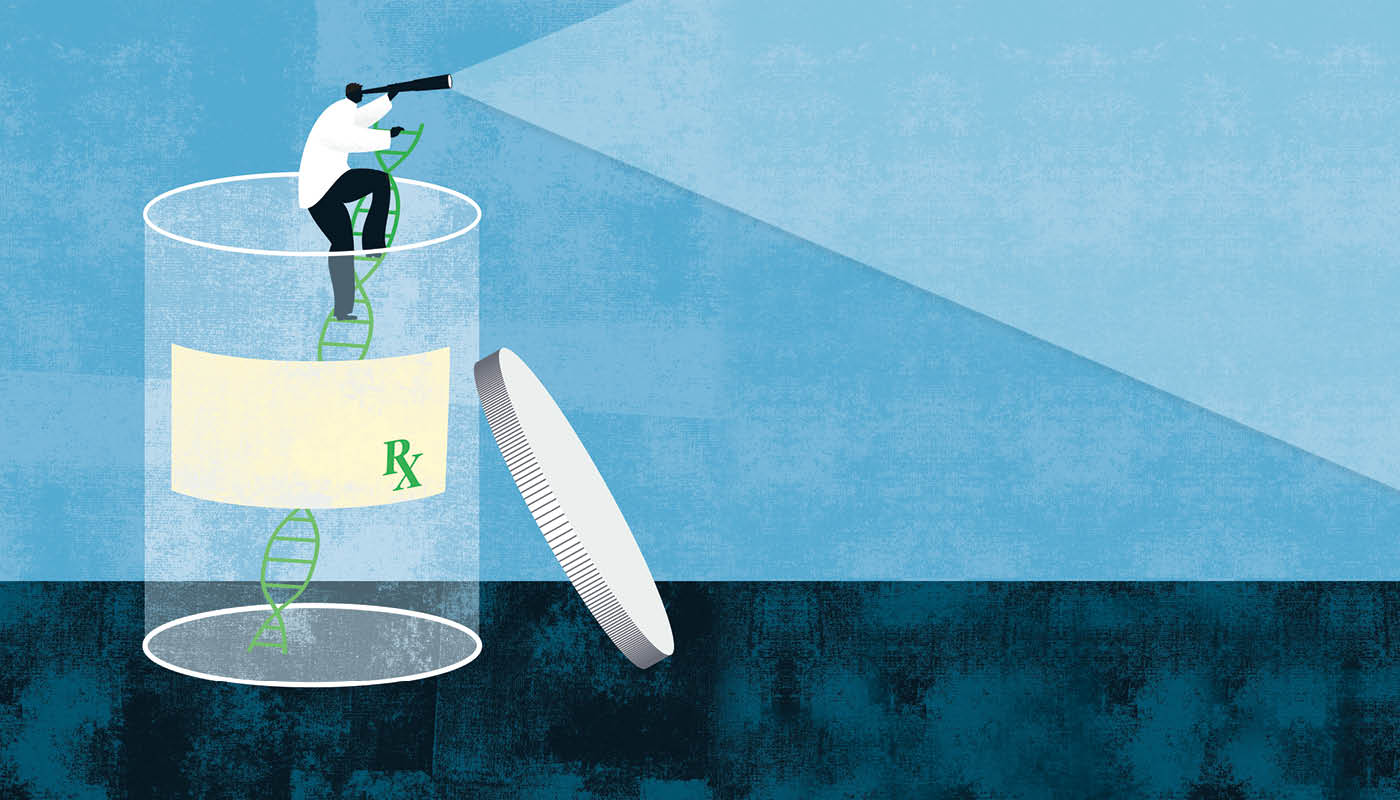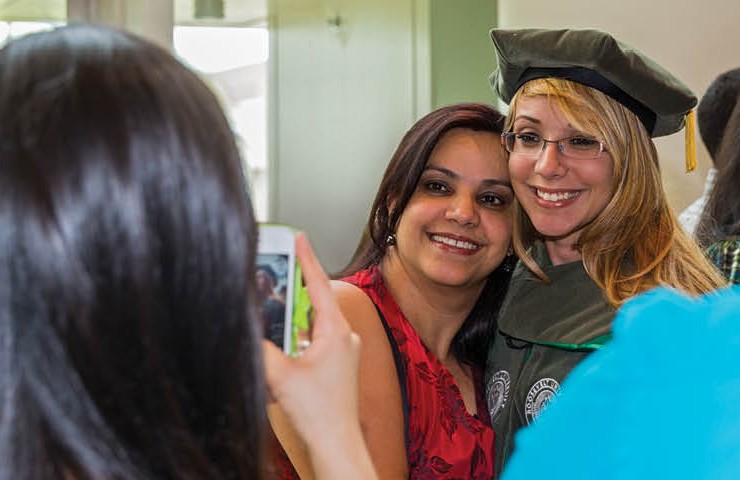
Veronica Jimenez knew when she started at Roosevelt University’s new College of Pharmacy in 2011 that she wanted to be a retail pharmacist serving Chicago’s Latino community.
Three years later, she is a 26-year-old bilingual pharmacist for Walmart. A member of Roosevelt’s first graduating pharmacy class and the only Latina, Jimenez not only achieved her career goal, she also used skills she learned to help save her father’s life.
“Before I came to Roosevelt, I didn’t know a lot about medications,” said Jimenez, one of 61 College of Pharmacy students who graduated in May. “Thanks to the program, I learned how to navigate through a family health care crisis, asking questions and seeking answers, all the while doing what I was taught to do – which is to keep a cool head.”
Jimenez had just finished nearly two years of coursework at Roosevelt’s Schaumburg Campus as well as the initial 480 hours of introductory pharmacy field and inter-professional practice when her father was diagnosed with inoperable brain cancer. “I didn’t want to just accept the doctors’ opinion that we should take him home to die,” said Jimenez, whose father, a warehouse foreman, and mother, a school lunchroom manager, came to Chicago from Mexico more than three decades ago in search of a better life.
“With all the health care training I was receiving and all the time I was spending on my studies, I knew I owed it to my family to be proactive,” said Jimenez, the fourth of six children and the first in her family to receive an advanced degree. The Roosevelt student researched her father’s disease; she identified medications and side effects; and she found a doctor whom she convinced, using clinical skills she learned at Roosevelt, to take her father’s case – actions that improved his condition and prolonged his life.
“Veronica, like other students in her class, is a creative thinker,” said George MacKinnon, founding dean of the College of Pharmacy. “She used what she learned to take the initiative, problem solve and advocate on behalf of her father.”
Pharmacy Grads Find Work
Since its founding, the College of Pharmacy, one of the few pharmacy programs in the nation and the only one in the Midwest to offer the PharmD degree in a three-year format, has received 2,300 applicants and admitted 240 students into four classes, including the Class of 2017. Seventy percent of Roosevelt’s inaugural class is now working as pharmacists and 35 graduates have opted for community pharmacy where average annual salaries can top $100,000.
Twenty-three graduates from the inaugural class today work at community pharmacies in Illinois; 12 are at community pharmacies in Arizona, California, Indiana, New Jersey, Ohio, Texas and Wisconsin; seven are residents at Illinois and Wisconsin hospitals (see related story); and one has become an information-technology (IT) pharmacist streamlining data platforms at a Louisiana hospital in conjunction with the Affordable Care Act.
“As I see it, graduates of our first class are pioneers,” MacKinnon said. “They trusted us to provide a program that not only prepares them for real-life situations but also for a changing health care landscape that demands they be on the front line as the patient’s most accessible caregiver.” Although going separate ways, students in the first graduating class agree they won’t forget their common experiences as members of a community of learners.
“Because of the program’s emphasis on working together, I made a number of lifelong friends,” said Michelle Wachtor, 23, a new Walgreens pharmacist whose suburban Chicago district includes Frankfort, Joliet, Peru and Rochelle, Ill. Wachtor received all As in her advanced practice experiences and also won the Roosevelt Enlightenment Award for volunteer efforts.
“The graduates of our first class are pioneers. They trusted us to provide a program that not only prepares them for real-life situations but also for a changing landscape that demands they be on the front line as the patient’s most accessible caregiver.” – George MacKinnon, founding dean, College of Pharmacy
“It’s not a program that herds you into big lecture halls, nor does it encourage you to exist in a silo,” said Jake Backhoff, 25, also a Walgreens pharmacist whose largely rural district extends from Champaign to Effingham, Ill. “At Roosevelt, you learn to work together and communicate – skills you must have as a pharmacist.”
“I liked the small class sizes,” added Bill Hunyh, 24, the winner of the college’s Commitment Award and Asian Student Pharmacist Association Recognition Award and currently a pharmacist at a Target in his native California. “It gave me the chance to work alongside others and to also take my own initiative on projects inside and outside of class.”
And Nancy Caddigan, 54, who is now an IT pharmacist at a Baton Rouge, La., hospital, said, “It’s been a team effort for all of us to get through the program. I expect the dynamic to continue as I interact with all the hospital departments that have ties to pharmacy.”
In addition to classroom work, Roosevelt’s pharmacy students learn the ins and outs of daily pharmacy care through advanced patient-care field rotations. Jimenez, for example, was at Presence St. Joseph Hospital’s intensive care unit in Joliet, Ill.; Mt. Sinai Health Systems in Chicago, in internal medicine and later in ambulatory care; Walgreens in Chicago for six weeks of retail management training; and Westlake Hospital in Melrose Park, Ill. at the hospital pharmacy unit.
That’s a fraction of the sites the first class had to choose from for its 384 rotations, according to Joan Hardman, the College of Pharmacy’s director of experiential education. “Our partnerships with health care providers and our rotation sites throughout the region are continuing to expand,” she said.
Like her peers, Jimenez admirably represented Roosevelt and its new pharmacy program during her rotations. “When I got out there, I noticed students from other pharmacy programs were different,” she said. “They didn’t seem to have the experience I did working with others on patient care and I realized that the training at Roosevelt prepared me to be a contributing member of a health care team, which helped me excel.”
Unsurprisingly, working with family members at home to support her father also became part of Jimenez’s college life. “I’m super proud of Veronica,” said Claudia Jimenez, a 2007 Roosevelt University graduate in Early Childhood Education who initially recommended the University and its new pharmacy program to her younger sister. “Even during tough times, Veronica was always studying. But somehow, she always found time to look up things and to share what she learned that could help our father.”
Jimenez knew much about her father’s rare form of cancer, glioblastoma, when she wrote and emailed a Subjective, Objective, Assessment and Plan (SOAP) note to a neuro-oncologist at the University of Chicago Medical Center. “We start teaching students the concept in their first year,” said Melissa Hogan, chair of Clinical and Administrative Sciences, who defines a SOAP note as “a method health care workers use to communicate to one another about a patient’s care.”
SOAP notes regarding basic patient cases are taught first, followed by cases that increasingly become more complicated. During final rotations, students are expected to write SOAP notes every day about real patients they encounter, according to Hogan, associate professor of clinical sciences and one of Jimenez’s instructors.
35 graduates in Roosevelt’s inaugural class are community pharmacists, where salaries can top $100,000.
Jimenez wasn’t far into her rotations when she reached out to Dr. Rimas Lukas, making the case for a second opinion and shunt that she believed could drain excess fluid building up in her father’s brain. “She knew what the diagnosis was, and she was able to very adeptly convey the key bits of information,” the University of Chicago Medical Center neuro-oncologist told the Chicago Sun-Times in a story about the Roosevelt pharmacy graduate.
The day after the SOAP note was sent, Jimenez’s father was admitted to the University of Chicago Medical Center where he had a shunt placed and was subsequently started on radiation and chemotherapy. “He perked up immediately, and while this will be a serious disease for the rest of his life, I believe the support that Veronica and her family has been providing is a major plus for Mr. Jimenez,” said Lukas.
Hogan is proud that Jimenez – as a Roosevelt student – took that kind of initiative. “This is a tremendous credit to her ability and understanding of the skills she will be using every day as a pharmacist.”
And Jimenez is proud to be a member of the College of Pharmacy’s first graduating class. “I tell people how everyone in our class worked well together,” she said. “I’ve already recommended the program to several people and will continue to do so.”

Leave a Reply